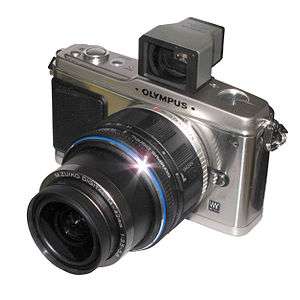Olympus PEN E-P1
 | |
| Overview | |
|---|---|
| Type | Micro Four Thirds, interchangeable lens camera |
| Lens | |
| Lens | Micro Four Thirds System mount |
| Sensor/Medium | |
| Sensor | Four Thirds System 18.00×13.50 mm Live MOS |
| Maximum resolution | 4032×3024 (12.3 megapixels) |
| Storage | Secure Digital card |
| Focusing | |
| Focus modes | Single, continuous, manual |
| Focus areas | 11 area contrast detect auto-focus, selectable |
| Exposure/Metering | |
| Exposure modes | Program, shutter-priority, aperture-priority, manual |
| Metering modes | ESP multi patterned, Center-weighted average (60%), Spot (2%) |
| Flash | |
| Flash | hot shoe allows for external flashes |
| Shutter | |
| Shutter | 1/4,000 to 60 s, 30 minutes bulb |
| Continuous shooting | 3 frame/s |
| Viewfinder | |
| Viewfinder | live preview, optional optical viewfinder |
| General | |
| Rear LCD monitor | 3" 230,000 pixel TFT LCD on screen with live preview |
| Battery | Olympus BLS-1 Lithium-ion battery |
| Dimensions | 121 × 70 × 36 mm (4.7" × 2.8" × 1.4") |
| Weight | 335 g (11.8 ounces) |
| Footnotes | |
| [1][2] | |
The Olympus Pen E-P1 announced on 16 June 2009 is Olympus Corporation's first camera that adheres to the Micro Four Thirds (MFT) system design standard. The first camera to use the Micro Four Thirds mount was Panasonic's G-1 camera.
Features
The design of the camera is reminiscent of the Olympus Pen half frame film cameras and is marketed as the Olympus digital PEN. The model presented on 16 June 2009 was very similar in looks to the Olympus Pen F. Initially, two micro 4/3 lenses were available from Olympus, one 14–42 mm f/3.5–5.6 zoom and a 17 mm f/2.8 pancake prime lens. Remarkably, with the exception of the optical viewfinder, the E-P1 seemed to fit most of the features found on the Olympus E-620, a larger Four Thirds system DSLR, into the small, compact MFT form factor.[3][4]
In addition to Micro Four Thirds lenses, Olympus offers adapters allowing the use of Four Thirds lenses, or OM Zuiko lenses originally manufactured for use on the classic OM series of film SLR cameras that Olympus was famed for years ago.
The E-P1 does not have a built-in optical or electronic viewfinder, but instead uses the large 3-inch (76 mm) inch color "HyperCrystal" LCD on the back of the camera. The fixed LCD panel with anti-reflective coating presents a 100% live preview of the image as seen by the sensor. Olympus did offer an optional accessory hotshoe mounted optical viewfinder, the VF-1, that provided for a 17 mm lens angle of view
The E-P1 auto focuses using contrast-detection.[2]
Other features include 720P30 video recording[5] with the ability to process the video in camera with different effects.
In an interview, Mr Akira Watanabe, SLR Planning Department Manager for Olympus Imaging, said that for a number of reasons Micro Four Thirds was developed to meet the demands of those who wanted a DSLR, but without the size problems that come with one.[6]
The 17 mm f/2.8 pancake lens or the 14–42 mm f/3.5–5.6 zoom lens are of the Micro Four Thirds lens mount which means they are smaller than Four Thirds lenses which require an adapter to fit the Micro Four Thirds body.
Several third-party manufacturers offer adapters for lenses of virtually all single-lens reflex and rangefinder systems, plus some cinema lenses.
Successor models
The E-P1 was replaced by the Olympus Pen E-P2 which was announced in November 2009. The third model in the Pen line, the Olympus Pen E-P3, was announced in June 2011.
References
- ↑ "E-P1". Hamburg: Olympus Europa. 2009. Retrieved 25 September 2009.
- 1 2 Joinson, Simon (July 2009). "Olympus Pen E-P1 In-depth Review". Digital Photography Review. Retrieved 25 September 2009.
- ↑ "Olympus E-P2 Review", Digital Photography Review, retrieved 4 September 2011
|chapter=ignored (help). - ↑ http://www.dpreview.com/products/olympus/slrs/oly_ep1
- ↑ "Olympus E-P1 Review", Digital Photography Review, retrieved 4 September 2011
|chapter=ignored (help). - ↑ Grayson, Matt (18 June 2009). "Olympus E-P1 Digital Camera Review". ePHOTOzine. Shireoaks: Magazine Publishing. Retrieved 25 September 2009.
External links
![]() Media related to Olympus E-P1 at Wikimedia Commons
Media related to Olympus E-P1 at Wikimedia Commons
- Olympus Pen E-P1, UK: Olympus.
Reviews
- "Olympus E-P1 review", ePHOTOzine
- "Olympus Pen E-P1 In-depth Review", Dpreview.
| Preceded by None – new line |
Olympus Micro Four Thirds system PEN cameras November 2008–present |
Succeeded by Olympus Pen E-P2 |
| Micro Four Thirds cameras timeline | |||||||||||||||||||||||||||||||||||||||||||||||||||||||||||||||||||||||||||||||||||||||||||||||||||||||||||||||||||||||||||||||||||||||||||||||||||||||||||||||||||||||||||||||||||||||||||||||||||||||||||||||||||||||||||||||||||||||||||||||||||||||||||||||||||||||||||||||||||||||||||||||||||||||||||||||||||||||||||||||||||||||||||||||||||||||||||||||||||||||||||||||||||||||||||||||||||||||||||||||||||||||||||||||||||||||||||||||||||||||||||||||||||||||||||||||||||||||||||||||||||||||||||||||||||||||||||||||||||||||||||||||||||||||||||||||||||||||||||||||||||||||||||||||||||||||||||||||||||||||||||||||||||||||||||||||||||||||||||||||||||||||||||||||||||||||||||||||||||||||||||||||||||||||||||||||||||||||||||||||||||||||||||||||||||||||||||||||||||||||||||||||||||||||||||||||||||||||||||||||||||||||||||||||||||||||||||||||||||||||||||||||||||||||||||||||||||||||||||||||||||||||||||||||||||||||||||||||||||||||||||||||||||||||||||||||||||||||||||||||||||||||||||||||||||||||||||||||||||||||
|---|---|---|---|---|---|---|---|---|---|---|---|---|---|---|---|---|---|---|---|---|---|---|---|---|---|---|---|---|---|---|---|---|---|---|---|---|---|---|---|---|---|---|---|---|---|---|---|---|---|---|---|---|---|---|---|---|---|---|---|---|---|---|---|---|---|---|---|---|---|---|---|---|---|---|---|---|---|---|---|---|---|---|---|---|---|---|---|---|---|---|---|---|---|---|---|---|---|---|---|---|---|---|---|---|---|---|---|---|---|---|---|---|---|---|---|---|---|---|---|---|---|---|---|---|---|---|---|---|---|---|---|---|---|---|---|---|---|---|---|---|---|---|---|---|---|---|---|---|---|---|---|---|---|---|---|---|---|---|---|---|---|---|---|---|---|---|---|---|---|---|---|---|---|---|---|---|---|---|---|---|---|---|---|---|---|---|---|---|---|---|---|---|---|---|---|---|---|---|---|---|---|---|---|---|---|---|---|---|---|---|---|---|---|---|---|---|---|---|---|---|---|---|---|---|---|---|---|---|---|---|---|---|---|---|---|---|---|---|---|---|---|---|---|---|---|---|---|---|---|---|---|---|---|---|---|---|---|---|---|---|---|---|---|---|---|---|---|---|---|---|---|---|---|---|---|---|---|---|---|---|---|---|---|---|---|---|---|---|---|---|---|---|---|---|---|---|---|---|---|---|---|---|---|---|---|---|---|---|---|---|---|---|---|---|---|---|---|---|---|---|---|---|---|---|---|---|---|---|---|---|---|---|---|---|---|---|---|---|---|---|---|---|---|---|---|---|---|---|---|---|---|---|---|---|---|---|---|---|---|---|---|---|---|---|---|---|---|---|---|---|---|---|---|---|---|---|---|---|---|---|---|---|---|---|---|---|---|---|---|---|---|---|---|---|---|---|---|---|---|---|---|---|---|---|---|---|---|---|---|---|---|---|---|---|---|---|---|---|---|---|---|---|---|---|---|---|---|---|---|---|---|---|---|---|---|---|---|---|---|---|---|---|---|---|---|---|---|---|---|---|---|---|---|---|---|---|---|---|---|---|---|---|---|---|---|---|---|---|---|---|---|---|---|---|---|---|---|---|---|---|---|---|---|---|---|---|---|---|---|---|---|---|---|---|---|---|---|---|---|---|---|---|---|---|---|---|---|---|---|---|---|---|---|---|---|---|---|---|---|---|---|---|---|---|---|---|---|---|---|---|---|---|---|---|---|---|---|---|---|---|---|---|---|---|---|---|---|---|---|---|---|---|---|---|---|---|---|---|---|---|---|---|---|---|---|---|---|---|---|---|---|---|---|---|---|---|---|---|---|---|---|---|---|---|---|---|---|---|---|---|---|---|---|---|---|---|---|---|---|---|---|---|---|---|---|---|---|---|---|---|---|---|---|---|---|---|---|---|---|---|---|---|---|---|---|---|---|---|---|---|---|---|---|---|---|---|---|---|---|---|---|---|---|---|---|---|---|---|---|---|---|---|---|---|---|---|---|---|---|---|---|---|---|---|---|---|---|---|---|---|---|---|---|---|---|---|---|---|---|---|---|---|---|---|---|---|---|---|---|---|---|---|---|---|---|---|---|---|---|---|---|---|---|---|---|---|---|---|---|---|---|---|---|---|---|---|---|---|---|---|---|---|---|---|---|---|---|---|---|---|---|---|---|---|---|---|---|---|---|---|---|---|---|---|---|---|---|---|---|---|---|---|---|---|---|---|---|---|---|---|---|---|---|---|---|---|---|---|---|---|---|---|---|---|---|---|---|---|---|---|---|---|---|---|---|---|---|---|---|---|---|---|---|---|---|---|---|---|---|---|---|---|---|---|---|---|---|---|---|---|---|---|---|---|---|---|---|---|---|---|---|---|---|---|---|---|---|---|---|---|---|---|---|---|---|---|---|---|---|---|---|---|---|---|---|---|---|---|---|---|---|---|---|---|---|---|---|---|---|---|---|---|---|---|---|---|---|---|---|---|---|---|---|---|---|---|---|---|---|---|---|---|---|---|---|---|---|---|---|---|---|---|---|---|---|---|---|---|---|---|---|---|---|---|---|---|---|---|---|---|---|---|---|---|---|---|---|---|---|---|---|---|---|---|---|---|---|---|---|---|---|---|---|---|---|---|---|---|---|---|---|---|---|---|---|---|---|---|---|---|---|---|---|---|---|---|---|---|---|---|---|---|---|---|---|---|---|---|---|---|---|---|---|---|---|---|---|---|---|---|---|---|---|---|---|---|---|---|---|---|---|---|---|---|---|---|---|---|---|
| |||||||||||||||||||||||||||||||||||||||||||||||||||||||||||||||||||||||||||||||||||||||||||||||||||||||||||||||||||||||||||||||||||||||||||||||||||||||||||||||||||||||||||||||||||||||||||||||||||||||||||||||||||||||||||||||||||||||||||||||||||||||||||||||||||||||||||||||||||||||||||||||||||||||||||||||||||||||||||||||||||||||||||||||||||||||||||||||||||||||||||||||||||||||||||||||||||||||||||||||||||||||||||||||||||||||||||||||||||||||||||||||||||||||||||||||||||||||||||||||||||||||||||||||||||||||||||||||||||||||||||||||||||||||||||||||||||||||||||||||||||||||||||||||||||||||||||||||||||||||||||||||||||||||||||||||||||||||||||||||||||||||||||||||||||||||||||||||||||||||||||||||||||||||||||||||||||||||||||||||||||||||||||||||||||||||||||||||||||||||||||||||||||||||||||||||||||||||||||||||||||||||||||||||||||||||||||||||||||||||||||||||||||||||||||||||||||||||||||||||||||||||||||||||||||||||||||||||||||||||||||||||||||||||||||||||||||||||||||||||||||||||||||||||||||||||||||||||||||||||



